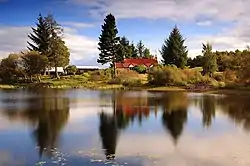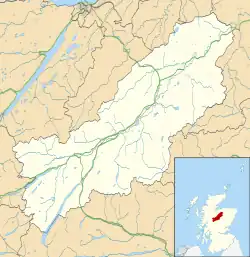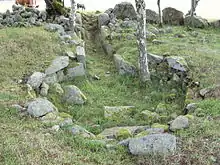Avielochan
| |
|---|---|
 | |
 Avielochan Location within the Badenoch and Strathspey area | |
| OS grid reference | NH905165 |
| Council area | |
| Country | Scotland |
| Sovereign state | United Kingdom |
| Police | Scotland |
| Fire | Scottish |
| Ambulance | Scottish |
| UK Parliament | |
| Scottish Parliament | |
Avielochan (Scottish Gaelic: Aghaidh an Lochain) is a hamlet in the historical county of Inverness-shire, within the Highland council area of Scotland. It is located north of Aviemore, on the A9 road. The area is noted for its prehistoric cairn.
Geography and wildlife

Avielochan is located in Strathspey[1] in central, northern Scotland, within the Cairngorms National Park. The village is located south of Kinveachy and north of Granish.[2] The settlement takes its name from the body of water Avie Lochan[3] (meaning "the small lake of Avie) archaically named Loch-na- mhoon, measuring about 90 yards long, and 50 across.[4] Prior to the great floods in 1829, there was a floating island on the loch measuring about 30 yards across.[4] It attracts ospreys during the spring and summer months and goldeneye, coot and Slavonian grebe, amongst others.[5] Red squirrel, red deer, roe deer, black grouse and capercaillie inhabit the area.[5]
Buildings
Avelochan Farm lets out self-catering cottages during the warmer months of the year to tourists.[5] The farm itself covers an area of 270 hectares, with arable fields, rough grazing and woodland.[6] At certain times in the year it has around 80 cattle and some 60 Cheviot ewes which are crossed with a Suffolk tup before they are sold in early autumn.[6] One building of note is Clach Mhor (meaning 'big stone' in Gaelic) which is located on the edge of the village.[7]
Chamber tomb

The area is noted for its prehistoric chamber tomb stones which are said to be particularly old by some sources, although they have not been dated reliably.[8][9] The site contains a cairn which is very circular in shape except for a slight flattening at the entrance, where part of a lignite amulet has been unearthed.[9][10] The tumulus is about 40 feet in diameter.[1]
The cairn is said to be "aligned" with Glen Einich, and has views of the Cairngorm Mountains.[11]
References
- 1 2 Thompson, Francis (1979). Portrait of the Spey. Hale. p. 93. ISBN 978-0-7091-7468-4. Retrieved 20 February 2011.
- ↑ Google Maps (Map). Google. Retrieved 20 February 2011.
- ↑ "Get -a-Map". Ordnance Survey. Retrieved 21 Feb 2011.
- 1 2 The Topographical, Statistical, and Historical Gazetteer of Scotland: A-H. A. Fullarton. 1842. p. 82. Retrieved 20 February 2011.
- 1 2 3 "Welcome". Avielochan Cottages. Retrieved 20 February 2011.
- 1 2 "The Farm". Avielochan Cottages. Archived from the original on 16 February 2011. Retrieved 20 February 2011.
- ↑ Royal Institute of British Architects (1 January 1994). RIBA journal. RIBA Journals. p. 46. Retrieved 20 February 2011.
- ↑ Prehistoric Society (London; England); University of Cambridge. University Museum of Archaeology and Ethnology (1948). Proceedings of the Prehistoric Society for ... University Museum of Archaeology and Ethnology. p. 176. Retrieved 20 February 2011.
- 1 2 The Prehistory of Scotland. Taylor & Francis. p. 52. Retrieved 20 February 2011.
- ↑ Henshall, Audrey S.; Ritchie, James Neil Graham (2001). The chambered cairns of the central Highlands: an inventory of the structures and their contents. Edinburgh University Press. p. 84. ISBN 978-0-7486-0643-6. Retrieved 20 February 2011.
- ↑ Bradley, Richard; Batey, Colleen E. (1 July 2000). The good stones: a new investigation of the Clava Cairns. Society Antiquaries Scotland. p. 182. ISBN 978-0-903903-17-2. Retrieved 20 February 2011.